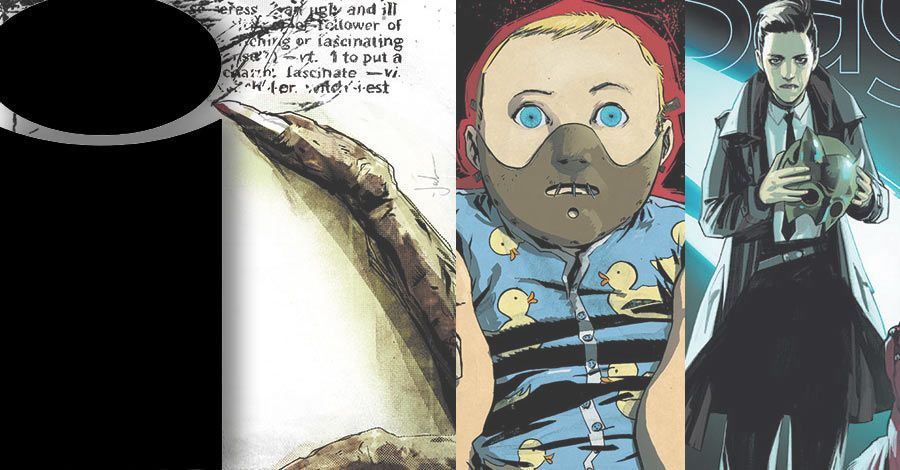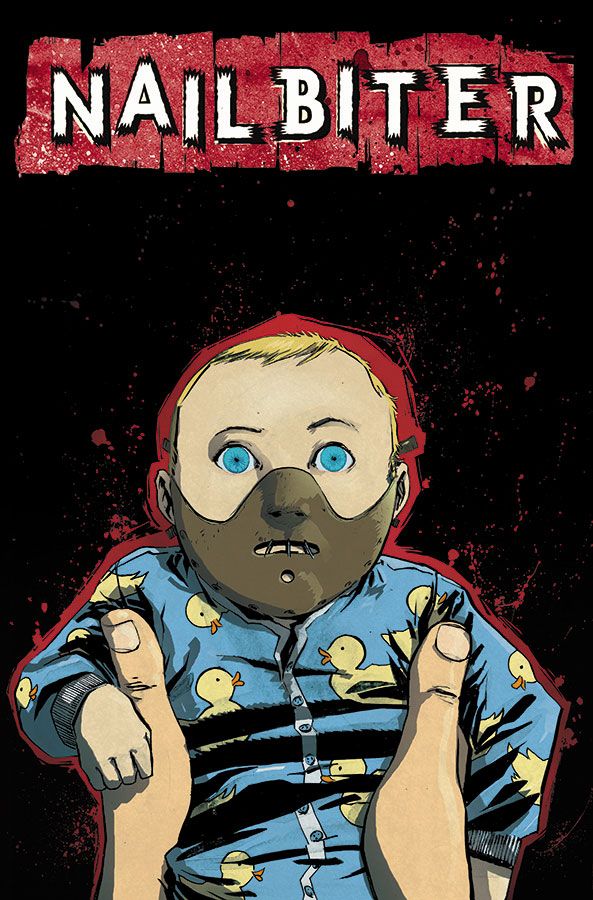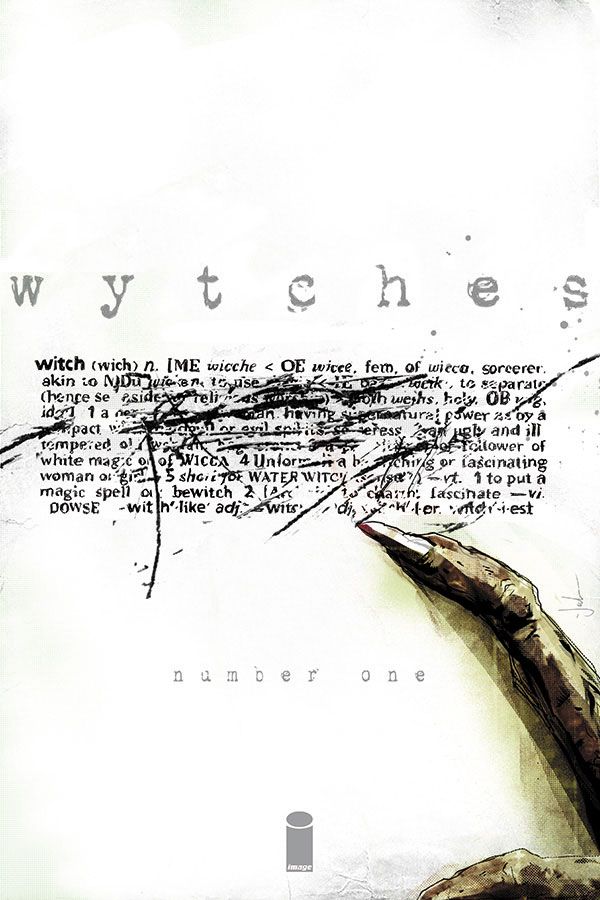Image Comics and its stable of creators did very well at Friday night's Eisner Awards, and today prizewinners Brian K. Vaughan and Scott Snyder, and once and future contenders Ivan Brandon, Becky Cloonan, Josh Williamson, Jeff Lemire, Kyle Higgins, and Joe Kelly spoke with fans at Comic-Con International in San Diego about what it takes to write for comics. We'll have live updates throughout the hour, so keep refreshing this page!
An upcoming issue of "Nailbiter" will feature Brian Michael Bendis as a guest star. "[The Nailbiter] is a very big Brian Michael Bendis fan, but he's a little mad he killed Peter Parker," Williamson said. He said he's running everything by Bendis, because writing him "is terrifying."
Cloonan next talked about "Southern Cross," which is illustrate by Andy Belanger -- in a departure from Cloonan's usual role as writer/artist or artist only. "It's been an easy transition," she said, because she has an artist she can "absolutely trust." "And I can write all this crazy stuff and not have to draw it."
Snyder's "Wytches" with Jock will reexamine the mythology of witches. "When you give them something they want, like a baby to eat, they give you something you need, like a cure to disease." It combines terror with responsibility, he added.
Kelly spoke about his now-classic "I Kill Giants," which he wrote in his early days as a parent, confronting the fears that can come along with that, and imagining "what my quirky daughter might be like."
"It's about fears and dealing with your own fears, and the more you can work with that the more you'll connect," Kelly said.
"Saga" began its life as Vaughan was about to become a father, as well. "But nothing's more boring than hearing about someone's early days of fatherhood, so I wrapped that family stuff in ray guns and space ships."
Higgins said that "C.O.W.L." is "very personal to me, largely because I was a superhero in the 1960s." The comic originated as a short film, which caught Marvel's attention. "We always wanted to go back to the world we were building," he said, but it was a matter of finding the right time and artist.
Lemire's Image book is "Descender" with Dustin Nguyen. "'Descender' is not unlike a lot of my past work," he said. "It's a sci-fi story like 'Trillium' that spans different worlds and races ... and not unlike 'Sweet Tooth' it revolves around a young boy, in this case an artificial boy that was created to keep other boys company." When this boy finds himself the only remaining robot, though, he becomes hunted. Lemire joked that he calls the book "Space Tooth."
Ivan Brandon's just-announced "Drifter" takes place sometime between "now and Jetsons time." "The sorts of people who are going to be sent out to set things up [beyond Earth] are not going to be first-class passengers," he said. "It's about the dirty hands it takes to build the future."
Though Higgins comes from the world of film, he said "I don't write comics to make movies." Vaughan also praised Image for "taking zero percent of any movie rights." Brandon added that "those pressures exist in this industry, but not at this publisher."
Asked about working humor into different sorts of stories, "Bad Dog," Kelly said, is "the opposite of 'I Kill Giants'" in that it's a bit raunchy, "but it's got to be grounded." Cloonan added that it's more important to have your artist in mind while writing. "It's important to take advantage of his storytelling style," she said of Belanger.
"I think some of the best comedy comes from intense drama," Brandon said, recounting a memory of being at a funeral and seeing someone burst out laughing. "Humor's in everything, anywhere you are," he said.
"I write a political book about guys in costumes, in one of the most political eras in American history," Higgins said, but mentioned a character making fun of his friend for having a brat of a kid.
Asked about writing to reach a broad audience, Vaughan said "it's impossible to write for an audience." "Because what does that mean? Intelligence level? Tolerance for giant-testicled monsters?"
He does, though, keep in mind people who might not be familiar with comics as a medium. "If your only knowledge of words and pictures is picture books from when you were a kid, you can understand it."
Higgins said "C.O.W.L." is "not really a superhero book," but explores an era "in terms of a very, very black and white war years, very early post war years, idea of right and wrong" and seeing a noble institution corrupted.
The advantage of doing creator-owned, Higgins added, is that you can tell any story "and you don't have to service any continuity other than the one you create."
Snyder said writing comics was "very different from writing prose." "I thought I liked it, but it was very tough on my mental health because it's so isolating." Comics, by contrast, allows one to work with artists and a full team. "It's always adaptable and interesting, it's never just you in a room," he said.
Kelly added that "there's beauty in that you never see a script." "You can write two pages to describe one panel," he said, as opposed to film, where "page space is closely related to time," creating a different economy of storytelling.
Brandon added that budget is also a consideration for screenwriting, whereas "in comics anything is possible."
"Writing comics is awesome, writing TV and film is horrible," Vaughan joked.
Snyder said that, even writing company-owned characters, "you have to imagine they're creator-owned," as he has done in crafting his own version of Batman. But when he quit "American Vampire" for a time, "it made me so depressed to not have someplace I can go to tell any crazy story," and "The Wake" came to fill that void.
Higgins said that some of his books begin with a full backstory, but other times it's "only a sense of a character, and trying to be true to that." "You don't have to go all Tolkien on it," he said.
Williamson said he does have full maps for his characters' motivations and histories -- and their accents. Kelly joked that, 'I'm really impressed you went back in time and created Brian Michael Bendis just so he could appear in your comic."
Higgins said "fantastic art is the key" to selling your creator-owned series. "When you walk in with something that has fantastic art that is interesting and unique ... that creates kind of a precedent for how serious you are about a project and, from a logistic standpoint, a publisher can say 'I know it looks great, I'll take a chance on the story.'"
Snyder said there are also logistical concerns for what fits best in a publisher's lineup, but Image boss Eric Stephenson invited him to do "whichever book you're most passionate about" based on his previous body of work. Lemire said, though, too, that Stephenson took a chance on him even before he had a solid publishing record.



